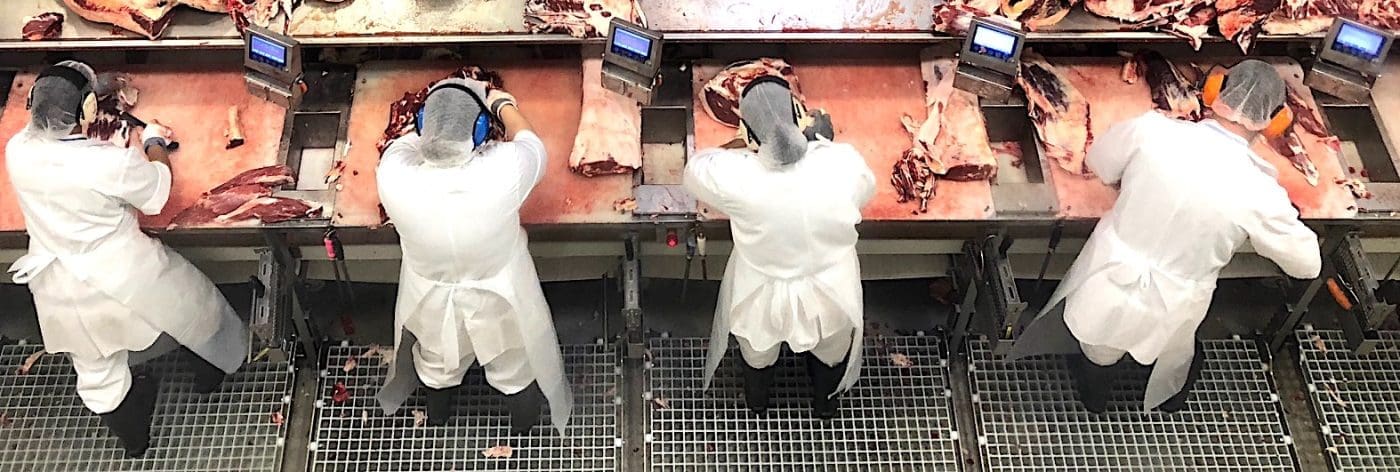
COLD, close-quarters working conditions have been blamed for COVID-19 clusters in meat processing establishments in a dozen countries around the world.
In addition to the United States, where thousands of positive test cases have been reported since March, shutting down up to 35 percent of the nation’s processing capacity, Brazil has reported a series of infection incidents in meat plants.
In Australia, just one episode has been reported, at Victoria’s Cedar Meats, where 111 staff have now been infected with the virus, closing the facility for a month, before re-opening today on reduced throughput.
Britain, France, Germany, Spain Holland and Ireland have now reported similar outbreaks in meat processing and food production facilities.
Three staff at a processing facility in South Yorkshire in the UK died from coronavirus and another four have been hospitalised, the operator, Cranswick Food Co announced this week.
The facility, which employs more than 1300 staff, said it had introduced extra measures to “protect both the physical and mental wellbeing of its people.”
British MP Geraint Davies said processing plant workers in England and Wales were more than five times more likely to die from COVID-19 than an average worker, according to data from the Office for National Statistics.
More than 600 positive COVID-19 detections have been made among meatworking staff in Ireland since April. Hundreds of positives have also been found in personnel in France, Holland and Spain.
In Germany, more than 20,000 meatworkers have been tested. Clusters of COVID-19 have been found in six German processing facilities, with 426 positive cases in the two worst affected businesses.
A new law is being passed in the German parliament preventing subcontracting of meat processing work to low-cost eastern European labourers who live in densely-packed conditions in caravans and temporary cabins.
Health officials are taking a closer look at coronavirus outbreaks associated with abattoirs and food processing.
While scientists have yet to pinpoint the particular conditions that are fuelling the meat processing spikes, officials are looking at unavoidable close working conditions on production lines and the very cold indoor conditions, often with intense air-conditioning to protect the meat, which allows the virus to flourish, The Australian reported this morning.
‘COVID-19 factories’
Abattoirs have been described as ‘COVID-19 factories’ by health experts over the past week.
“The high number of outbreaks in meat processing plants around the world deserves investigation,” Raina MacIntyre, the head of the public health school at the University of New South Wales in Sydney, told AFP.
The “gruelling, physical requirements of the work” could also have an impact on factory workers. Dr MacIntyre said.
Experts say the overcrowded conditions in many abattoirs makes it hard for workers to practice social distancing. This in turn made it harder to avoid sick colleagues and increases the chances of transmission, AFP said.
“Bringing large numbers of people together from across a community, having them working on long shifts with plenty of opportunities for transmission, is likely to result in heightened risk,” said Archie Clements, an epidemiology professor at Curtin University in Perth.
“The jobs are quite stressful, and the employees often come from backgrounds with high rates of smoking and other lifestyle factors that predispose to respiratory disease. So it is possible that this group is more susceptible than others,” Prof Clements said.
But slaughterhouses were not unique among assembly line employment in terms of overcrowding, said Antoine Flahault, director of global health at the Institute of Geneva, in Switzerland.
Cold and ventilation
One hypothesis is that the cold and humid conditions necessary for meatpacking rooms, as well as heavy ventilation, could contribute to the propagation of the virus.
“Very rapidly performed physical tasks in a production line, and high generation of aerosols in cold, enclosed conditions, (could) magnify transmission risk if one person is infected,” Dr MacIntyre said.



HAVE YOUR SAY